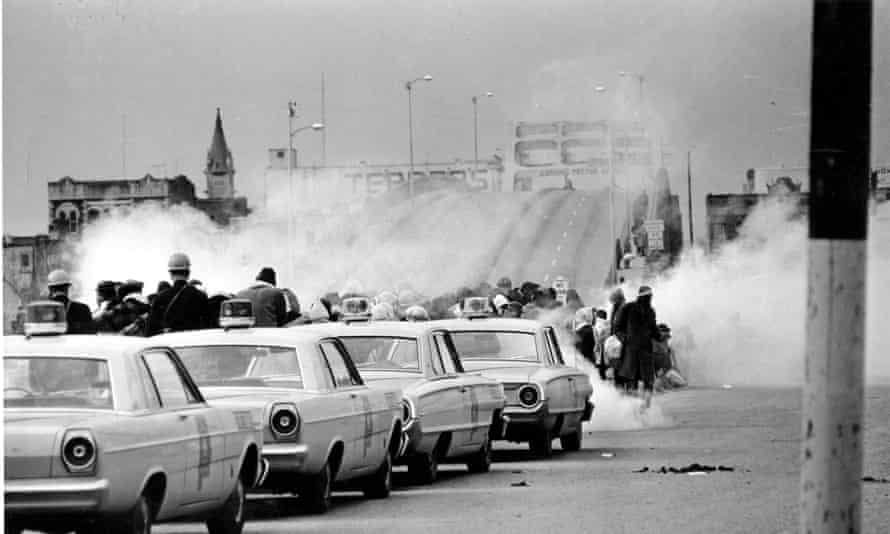Could Selma s Bloody Sunday Happen Again
On Saturday morning, Henry Allen sat at a cafeteria table at Selma High School with a breakfast of eggs, sausage and biscuit. The room was filled with friends telling stories and people singing protest songs. When he attended the school, he wouldn't accept been allowed in.
In the 1960s, when Selma was becoming a symbol of the fight over voting rights, its school system was segregated.
"We were under Jim Crow law but we didn't know it at the time," said Allen, who marched in protest half a century ago. The school system is integrated now merely the high school is completely black. Around 20% of the metropolis is not. White parents, Allen said, transport their kids to individual schools.
This kind of tension – betwixt the legacy of a civil rights revolution and the glaring inequalities of the nowadays – coursed through many conversations this weekend in Selma, where thousands of activists, educators and visitors gathered to celebrate the 55th anniversary of Bloody Sun, when protesters were brutally beaten as they marched for equal voting rights.
In such conversations, voting issues were more pressing than usual. In a heated presidential primary, millions of Americans are getting set for Super Tuesday. Several presidential candidates were in the city on Sunday, due to speak at events and march beyond the Edmund Pettus Bridge, a site of historical violence.

Rutha Harris, a member of the Freedom Singers, activists who led the civil rights motion through song, said she never expected to even so exist talking almost voting rights 55 years later Bloody Sunday and the passage of the landmark Voting Rights Deed.
"I think information technology'south gotten ameliorate but we yet take a lot to exercise," said Harris, who has lost rails of how many times she has returned to Selma from her home in Georgia. "They're still messing with the vote."
This yr's commemoration came amid increased scrutiny over voter suppression tactics, such as states removing people from the voter rolls or closing polling places. Alabama has restrictive policies: people take to show a photo ID to vote and there is no early voting. People with felonies also face severe hurdles to regaining their voting rights.
Selma, the birthplace of voting rights every bit nosotros know them, is grappling with such policies and with economic distress.
"Selma is stagnant, we tin can't motion frontward," said Jesse Marvin, of the unemployment and challenges in his hometown.
For him, fighting for civil rights was a family affair: he and his older siblings protested regularly, oftentimes landing in jail. And while his parents "didn't get involved with annihilation to practise with white folks", his mom helped in church kitchens where activists gathered.
Reflecting on Selma and the election, Marvin said the land of politics and civil rights today was difficult to tummy, especially given the history he witnessed and the rights for which he marched. He was carefully researching the candidates before going to vote.
At the high school cafeteria on Sabbatum, and throughout the weekend, chat oscillated betwixt the past and present – a narrative the people of Selma know well. But dissimilar the political debates, or the televised press conferences, the living memory of marching for, and receiving, civil rights seemed to underlie the fear and frustration.
Charles Mauldin, who marched as a 17 year old on Encarmine Lord's day, said the fact immature people had come up to listen to the stories gave him a sense of hope.
"Every bit desperate as the political climate seems," he said, "I feel very optimistic that young people will rise up like we did."
cliffordmader1967.blogspot.com
Source: https://www.theguardian.com/us-news/2020/mar/01/selma-alabama-bloody-sunday-1965-democratic-primary-voting-rights
0 Response to "Could Selma s Bloody Sunday Happen Again"
Post a Comment